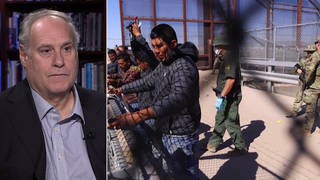
Topics
We speak with ABC News’ Brian Ross who exposed in 1998 the horrific labor conditions in the U.S. territory of Saipan. At the time, Jack Abramoff was Saipan’s hired gun on K Street and Tom DeLay was one of the island’s chief advocates on Capitol Hill. DeLay backed the sweatshop owners even though it was exposed that the factory was forcing women to have abortions and treated workers like indentured servants. [includes rush transcript]
Controversy is nothing new to Jack Abramoff. The Los Angeles Times reports Abramoff’s first political scandal dates back to 1972 when he ran for student council president at the Hawthorne School, an elementary and middle school in Beverly Hills California. Abramoff was reportedly disqualified for exceeding the spending limit in the race. In college Abramoff teamed up with two students who would become household names in Washington to take over the College Republican National Committee. They were anti-tax crusader Grover Norquist and Ralph Reed, founder of the Christian Coalition. After college Abramoff’s resume was diverse, from his brief Hollywood career to his secret dealings with the South African apartheid regime.
A 1995 investigation by Newsday revealed that Abramoff helped run a think — tank called the International Freedom Foundation. The organization was set up in 1986 and its goal was to improve the white South African apartheid government’s image in the West while demonizing Nelson Mandela and the African National Congress as communist tools. The Newsday report also quoted sources saying that the South African military helped finance the 1988 movie “Red Scorpion” which Abramoff wrote and produced. The movie was a sympathetic portrayal of an anti-communist African guerrilla commander and loosely based on Jonas Savimbi, the Angolan rebel leader who was an ally of both South Africa’s apartheid government and the U.S government.
We turn now to Abramoff’s special relationship with the South Pacific island of Saipan and how it connects to his ties to House Majority Leader Tom DeLay. Saipan is an American territory in the South Pacific also known as the Commonwealth of the Northern Mariana Islands. In the mid-1990s Abramoff was on the payroll of Saipan officials aiming to stop legislation that would crack down on sweat shop conditions, which run rampant on the island. In 1997, Abramoff arranged a lavish trip to the island of Saipan for Delay.
The Delay trip was originally reported by Brian Ross, Chief Investigative Correspondent for ABC News. We are going to play 2 excerpts from the report that aired on ABC’s 20/20 on March 13th, 1998. In this first excerpt, Ross interviews Allan Stayman, a Clinton administration official in the Department of Interior who was investigating labor conditions in Saipan. Brian also talks to a worker in one of the factories and ends with Eric Gregoire, a human rights worker. Most of the workers in these factories are from mainland China. {Thanks to WITNESS/Oxygen for providing addittional footage.)
We are joined on the phone by ABC News’ Brian Ross.
- Brian Ross, Chief Investigative Correspondent for ABC News
Transcript
AMY GOODMAN: I’m going to play two excerpts from the report which aired on ABC’s 20/20 March 13, 1998. In this first excerpt Ross interviews Allan Stayman, a Clinton administration official in the Department of the Interior, who was investigating labor conditions in Saipan. And Brian Ross also takes a worker in one of the factories and ends with Eric Gregoire, a human rights worker with the Department of the Interior. Most of the workers in these factories are from mainland China.
BRIAN ROSS: In fact, American authorities have discovered many Chinese workers are forced to sign secret agreements, known as shadow contracts, before they leave China, severely and, in some ways, illegally restricting their activities while on American soil. For example, in this agreement translated into English by American authorities, workers are forbidden to participate in any religious or political activity or to ask for a salary increase or even to fall in love or get married, much as might be the case in mainland China.
ALLAN STAYMAN: To allow them to bring that on to U.S. soil is a very deep concern. We’ve now documented the facts that management coerces female workers who become pregnant into having abortions.
BRIAN ROSS: Several of the cases, the government says it has documented, were at this factory, the one with a contract to make Ralph Lauren Polo t-shirts. This Chinese woman, Tu Xiao Mei, made t-shirts and pants at the factory until she became pregnant.
TU XIAO MEI: When I told them I was pregnant, they told me to have an abortion.
BRIAN ROSS: Tu Xiao Mei says she refused to have the abortion and has now been barred from entering the factory.
BRIAN ROSS: And you’re going to have your baby?
TU XIAO MEI: Yes.
BRIAN ROSS: Will you get your job back then?
TU XIAO MEI: Cannot.
BRIAN ROSS: Cannot get her job back, she says.
BRIAN ROSS: We want to ask you about the abortions, do you know about the complaints?
BRIAN ROSS: The bosses at the factory said they didn’t want to talk about what they called ridiculous allegations. But human rights workers say it’s common practice at this factory and others.
ERIC GREGOIRE: With 11,000 Chinese workers here, I have never seen a Chinese garment factory worker have a baby in my entire four years on Saipan.
BRIAN ROSS: There are no children in those barracks?
ERIC GREGOIRE: None. Inside that factory Chinese law applies, and Chinese law is supreme.
BRIAN ROSS: Even though it’s the United States of America?
ERIC GREGOIRE: That’s right. The flag doesn’t fly inside there.
AMY GOODMAN: And that was Eric Gregoire, a human rights worker who was talking to Brian Ross. This next excerpt also from Brian Ross’s report on ABC’s 20/20, which aired in 1998. This clip deals with Tom DeLay’s connection to Saipan. Brian Ross again speaks with the human rights activist, Eric Gregoire.
BRIAN ROSS: Saipan has cultivated some powerful friends back in Washington, spending millions of dollars on lobbyists and free trips in the middle of the winter for members of Congress and their staff. Congressman Tom DeLay of Houston, the third-ranking Republican in the House, went as a guest of the Saipan government over the Christmas holiday, a trip that included a tour of several factories and barracks, with one that even Congressman DeLay had to concede was nothing to write home about.
TOM DeLAY: But, you know, this trip has been very beneficial.
BRIAN ROSS: Still, at a fancy New Year’s Eve dinner thrown in his honor, DeLay praised the outgoing governor and vowed to fight efforts back in Washington to change Saipan’s immigration and labor laws.
TOM DeLAY: Because you are a shining light for what is happening in the Republican Party, and you represent everything that is good about what we’re trying to do in America, in leading the world in the free market system.
BRIAN ROSS: And DeLay is just one of more than 80 influential congressmen and congressional staff members who have been brought out to Saipan, most put up, as was DeLay, at the beachfront Hyatt Regency. About as far from the island sweatshops as it is possible to get on Saipan.
ERIC GREGOIRE: They’re paying your way, so, of course, you’re going to see what they want you to see.
BRIAN ROSS: They haven’t seen the Saipan you’ve seen.
ERIC GREGOIRE: You can’t see much from the Hyatt.
AMY GOODMAN: An excerpt of Brian Ross’s piece in 1998, chief investigative correspondent for ABC News. Welcome to Democracy Now!, Brian Ross.
BRIAN ROSS: It’s good to be here this morning.
AMY GOODMAN: Well, you did that piece, what, some more than seven years ago. Your response now?
BRIAN ROSS: Well, it’s interesting to watch this unfold because the man behind the scenes in every case was Jack Abramoff. In the footage we had on World News Tonight last night showing DeLay arriving in Saipan. He’s wearing a funny-colored floral hat and is greeted by a man in a beard who’s Jack Abramoff. Big bear hugs all around. And it was Abramoff then who shepherded him around the island, made sure he would see what he wanted him to see. And DeLay took his family along. It was New Year’s Eve. Temperatures were very nice, much nicer than back in the States. And that’s what Abramoff was able to achieve. DeLay then became active in blocking legislation that would have cracked down on some of those terrible labor practices in Saipan.
AMY GOODMAN: I want to go to the issue of forced abortion, which is astounding given Tom DeLay’s stand on abortion. Can you talk about that?
BRIAN ROSS: Well, it’s completely counter to anything that DeLay or most Republicans seem to espouse, that was, on that island there were forced abortions. And the workers there who are all young women, who often had to pay to get these jobs, knew the rules. And they were barred from having boyfriends and certainly barred from having children if they became pregnant. They knew where to go, and there were a few essential back-alley abortion mills on the island. And that’s where these young Chinese women went in order to keep their jobs. And that was the deal. That’s part of the situation that was essentially endorsed by DeLay when he fought the laws. The laws were established essentially exempting Saipan, although it is a U.S. territory, from U.S. labor laws.
AMY GOODMAN: So, of course, the clothing that is made there says “Made in the U.S.A.”
BRIAN ROSS: Exactly right. They have the exemptions made in the U.S.A. Ralph Lauren, Tommy Hilfiger, all the major brands have garment factories there, owned primarily by Chinese industrialists from Hong Kong who brought in Chinese material. And the Chinese workers who lived in something akin to — I don’t want to call it a labor camp, but it was surrounded by barbed wire. They were taken on the backs of trucks to these factories. They work 10, 12 hours a day, then brought back to their camps. An ugly scene there, one that was defended effectively by the garment manufacturers and by the government of Saipan at the time, with the expenditure of millions of dollars on Jack Abramoff.
AMY GOODMAN: You talk about how in a memo that ABC News got that Abramoff wrote to his law firm, Preston, Gates, Ellis (& Rouvelas, Meeds, at the time), that was paid $1.36 million by Saipan officials, said such congressional trips, talking about Tom DeLay, are one of the most effective ways to build permanent friends on the Hill.
BRIAN ROSS: Exactly what they did. And, of course, Abramoff has now admitted that he used these trips as ways essentially of providing favors to congressmen who in return would do favors for him on Capitol Hill. And it’s not just Saipan. Of course, other trips to Scotland, to Moscow, to Paris, all around the world. Abramoff was a very friendly travel agent for members of Congress who wanted to go somewhere.
AMY GOODMAN: BRIAN ROSS: Essentially what he accomplished was to stop legislation, which is easier to do than to get it through. He was able to block legislation that would have changed the labor and immigration laws in Saipan and made it illegal to have these kinds of contracts. You couldn’t have a contract like that in Los Angeles or anyplace else of the United States where the flag flies. But you could in Saipan. That was the loophole they were trying to close under the Clinton administration.
And in fact, when people at the Department of Interior attempted to do that, DeLay actually tried to introduce a bill to cut off funding for that particular section of the Department of Interior, to stop them from essentially backing the workers’ claims. And it became an ugly situation on Capitol Hill. And DeLay and others, but DeLay in particular, were involved in blocking the legislation and making sure that that status quo continued on Saipan.
AMY GOODMAN: Brian Ross, I want to thank you very much for being with us, chief investigative correspondent for ABC News.












Media Options